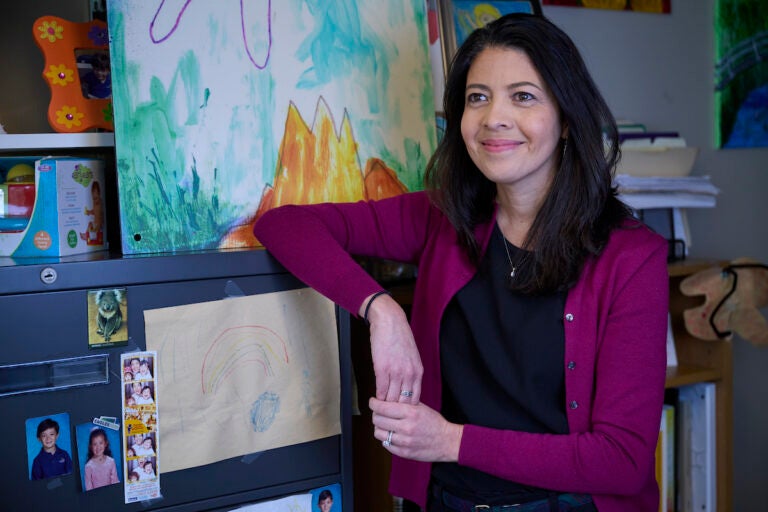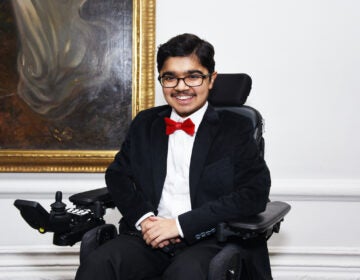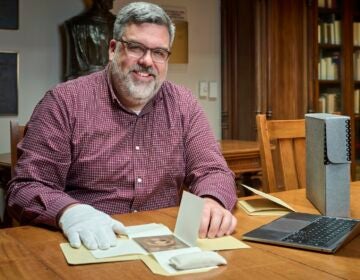UPenn study helps caregiver coaches extend autism care beyond therapy sessions
AT PEACE Study supports providers who coach parents of children with autism on how to implement therapy strategies into their daily routines.

Dr. Melanie Pellecchia is an Assistant Professor of Psychology in the Psychiatry Department at the University of Pennsylvania Perelman School of Medicine. (Photo courtesy Peggy Peterson)
From Philly and the Pa. suburbs to South Jersey and Delaware, what would you like WHYY News to cover? Let us know!
While out on a walk with her nearly two-year-old son Nobel King Heard, Kimberly King was talking on the phone with Nobel’s early intervention provider, Laura Balogh. They were trying a new technique to encourage Nobel, who has autism spectrum disorder and is nonverbal, to speak.
“Ready, set…,” said King, a personal chef and jewelry maker, before she took off running. “Go!” Nobel finished, following his mom’s lead.
King and Balogh broke out into cheers of excitement upon hearing Nobel, now almost three years old, say his first word.
It was an example of successful caregiver coaching, an early intervention method in which providers teach parents of young children with autism strategies to work with them in their daily routines and activities. The coaching program Project ImPACT helps children develop social, communication, imitation and play skills.
“I was working with just love, just trying to give my baby love, but [early intervention providers] gave me the educational resources, everything that I need,” King said.
Caregiver coaching is a relatively recent approach in early intervention care, and it’s at the center of Dr. Melanie Pellecchia’s Adaptive Trial of Parent Empowerment and Coaching in Early Intervention, or AT PEACE Study.
The assistant professor of psychology at the University of Pennsylvania was awarded a grant in July to investigate the effectiveness of different levels of support for providers increasing caregiver-mediated intervention through a five-year study. Her team recently completed the training and preparation period, and are just now getting started with the main course.
Pellecchia will be enrolling 400 children and 200 providers working in the Philadelphia Infant Toddler Early Intervention Program and Elwyn Preschool Early Intervention services, training them in Project ImPACT and then randomly selecting providers to receive different levels of support.
The AT PEACE Study aims to improve the fidelity of providers who coach caregivers, which means making sure providers are following early intervention manuals, like Project ImPACT, how they are supposed to.
In Pellecchia’s previous research, she found that when providers used Project ImPACT consistently, the children they worked with showed better outcomes within six months. However, most providers weren’t implementing it properly.
“The goal is to see how much support do providers actually need? How can we get them to do this program with fidelity? And what kinds of support would you need to do this at scale in a large urban city like Philadelphia?” Pellecchia said.
Pellecchia has been researching the effectiveness of early intervention care for autism spectrum disorder for approximately eight years. She shifted the autism care landscape, helping providers work with caregivers as active partners in intervention delivery by developing the Parent Empowerment and Coaching in Early Intervention (PEACE) toolkit, which is the support system being researched.
The toolkit focuses on how to coach parents rather than the strategies they are coaching parents on, which doesn’t come as naturally to some providers. It was initially based on Project ImPACT, but could be applied to any early intervention approach.
“What we found from our previous research is that providers know how to do the child-directed stuff pretty well, but they didn’t necessarily know how to do the caregiver coaching aspects as well, and so PEACE is focused on the coaching components,” Pellecchia said.
The PEACE toolkit comprises three parts: self-paced online resources, group facilitation and individual facilitation.
All providers in the study can access the online resources, which include videos, infographics and examples of how to implement caregiver coaching as well as online group chat spaces where providers can connect to create a community. The group facilitation sessions then occur for 10 to 12 weeks via Zoom meetings with an expert consultant.
Some providers will be randomized to receive targeted individual consultations if they need additional support.
Traditionally, providers would receive Project ImPACT training, but when they would go out to practice their approach in the field, real-world challenges that don’t come up in controlled learning settings would present themselves and providers wouldn’t have support to fall back on.
“The focus on doing this research in the community as opposed to doing it away from the community and then trying to let the community know what we found is very unique to this project,” Pellecchia said. “We are doing this in families’ homes with the people who are working directly in the homes. We don’t have a clinical space that families are coming to; we’re taking everything to them.”
With one foot in the research side and one foot in the real-world implementation of caregiver coaching, Balogh has been able to assess the study from a unique perspective.
While she has been an early interventionist in Philadelphia for nearly 14 years, she began coaching caregivers five years ago when she joined a research study by Pellecchia and connected with Project ImPACT. Now, she’s a trainer for other providers and a member of the AT PEACE Study team while continuing to be a provider.
“I have like so many little stories throughout my 13, 14 years, and I think this coaching program has completely shifted, though, my focus on realizing like, ‘Wow, if we really understand coaching and we really understand how to implement these strategies correctly, we can make such a bigger impact on an entire family than just working directly with one child.’”
King’s family is one place where Balogh has been able to see the toolkit succeed in real-time.
When Balogh met King, King didn’t feel a connection with her son. Nobel was nonverbal, didn’t make eye contact, had sensory issues, and King didn’t yet know he had autism.
Then, Balogh taught King how to understand her son’s behavior and how to respond to it. Now, King knows how to engage with her son and the things he loves, like running, drawing, painting and reading through pictures.
“I’m bonded now with my baby,” King said. “I didn’t feel bonded with my baby because he wasn’t like looking at me and I thought he didn’t want me to touch him or something, but it was just a sensory issue. Now, I know, to hug tight and squeeze him. I know certain little stuff like that, and that’s just the joy. I feel really, really good. I feel confident.”
When Nobel turns three next month, he will move out of the Philadelphia Infant Toddler Early Intervention Program and into Elwyn Preschool Early Intervention services, which is typically a drastic change that can be scary for many children and parents.
The AT PEACE Study is bridging that gap. Penn is partnering with both programs in this study to provide continuity with caregiver coaching approach options before three years old and after.
The coaching also prepares caregivers for the change in general. They can build a skill set to carry over into any changing care system throughout their children’s lives.
As Nobel enters Elwyn, King feels like she’s just “graduated” and is entering a new era with her son with confidence.
“I just wanna say this has changed my life,” King said. “This is awesome, that they even have service for us to use to give our children the knowledge that they need to go out in life to succeed.”

Saturdays just got more interesting.
WHYY is your source for fact-based, in-depth journalism and information. As a nonprofit organization, we rely on financial support from readers like you. Please give today.






